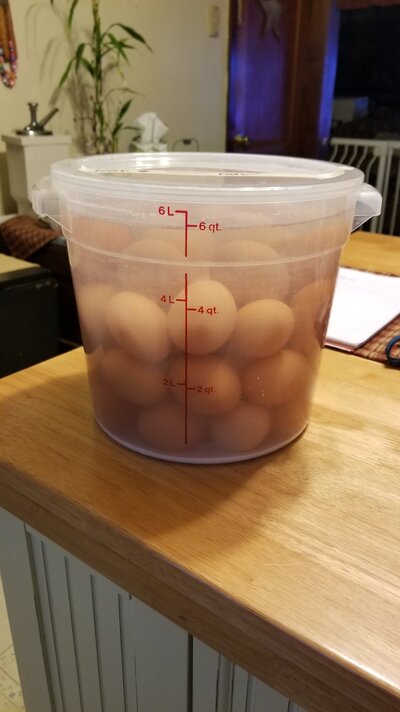drstratton
Enabler
After watching a video on Water Glassing earlier this year, I decided that I would like to try and preserve my eggs for winter using this method! I plan on pulling an egg out each month to see how well they are holding up! I'm super excited about seeing the results from this process...my husband...not so much...
I will eventually add all of the information of my experiment into an article!
I purchased a 1 gallon glass jar with a lid. I am using Mrs. Wages: Pickling Lime (Calcium Hydroxide) and also some Olive oil as suggested in the video to help keep the water from evaporating! One thing that I think I did wrong from the start was that I didn't get the lime mixed as thoroughly as I should have, so I've been going in and gently spinning the jar left, right, left, right...I will continue to do this until it's fully dissolved!
So the tools & steps I used:
A 1 gallon Jar with lid...glass or plastic works fine
1 oz. Calcium Hydroxide (Lime) (Make sure you use only Calcium Hydroxide with no other additives)
1 quart cool water
40 eggs per gallon seemed to be a good fit
Olive oil
Thoroughly mix your Lime into the quart of water (1oz lime to 1 quart of water is the ratio)(do not do as I did ). I already had my eggs in the container (I wanted to have as many as it would hold and decided I would pour the lime mixture over the top...one quart was perfect in my container), but you can mix in the jar and add the eggs after, which is what I will do next time since I now know I can fit in 40 eggs to 1 quart! I then poured some olive oil on top and covered with the lid!
). I already had my eggs in the container (I wanted to have as many as it would hold and decided I would pour the lime mixture over the top...one quart was perfect in my container), but you can mix in the jar and add the eggs after, which is what I will do next time since I now know I can fit in 40 eggs to 1 quart! I then poured some olive oil on top and covered with the lid!
Day 1
I have it sitting on my laundry room counter at the moment...once the Lime is better dissolved I will place it in my storeroom in the basement! It's cooler and has less daylight!


I will eventually add all of the information of my experiment into an article!
I purchased a 1 gallon glass jar with a lid. I am using Mrs. Wages: Pickling Lime (Calcium Hydroxide) and also some Olive oil as suggested in the video to help keep the water from evaporating! One thing that I think I did wrong from the start was that I didn't get the lime mixed as thoroughly as I should have, so I've been going in and gently spinning the jar left, right, left, right...I will continue to do this until it's fully dissolved!
So the tools & steps I used:
A 1 gallon Jar with lid...glass or plastic works fine
1 oz. Calcium Hydroxide (Lime) (Make sure you use only Calcium Hydroxide with no other additives)
1 quart cool water
40 eggs per gallon seemed to be a good fit
Olive oil
Thoroughly mix your Lime into the quart of water (1oz lime to 1 quart of water is the ratio)(do not do as I did
 ). I already had my eggs in the container (I wanted to have as many as it would hold and decided I would pour the lime mixture over the top...one quart was perfect in my container), but you can mix in the jar and add the eggs after, which is what I will do next time since I now know I can fit in 40 eggs to 1 quart! I then poured some olive oil on top and covered with the lid!
). I already had my eggs in the container (I wanted to have as many as it would hold and decided I would pour the lime mixture over the top...one quart was perfect in my container), but you can mix in the jar and add the eggs after, which is what I will do next time since I now know I can fit in 40 eggs to 1 quart! I then poured some olive oil on top and covered with the lid!Day 1
I have it sitting on my laundry room counter at the moment...once the Lime is better dissolved I will place it in my storeroom in the basement! It's cooler and has less daylight!
Last edited:





